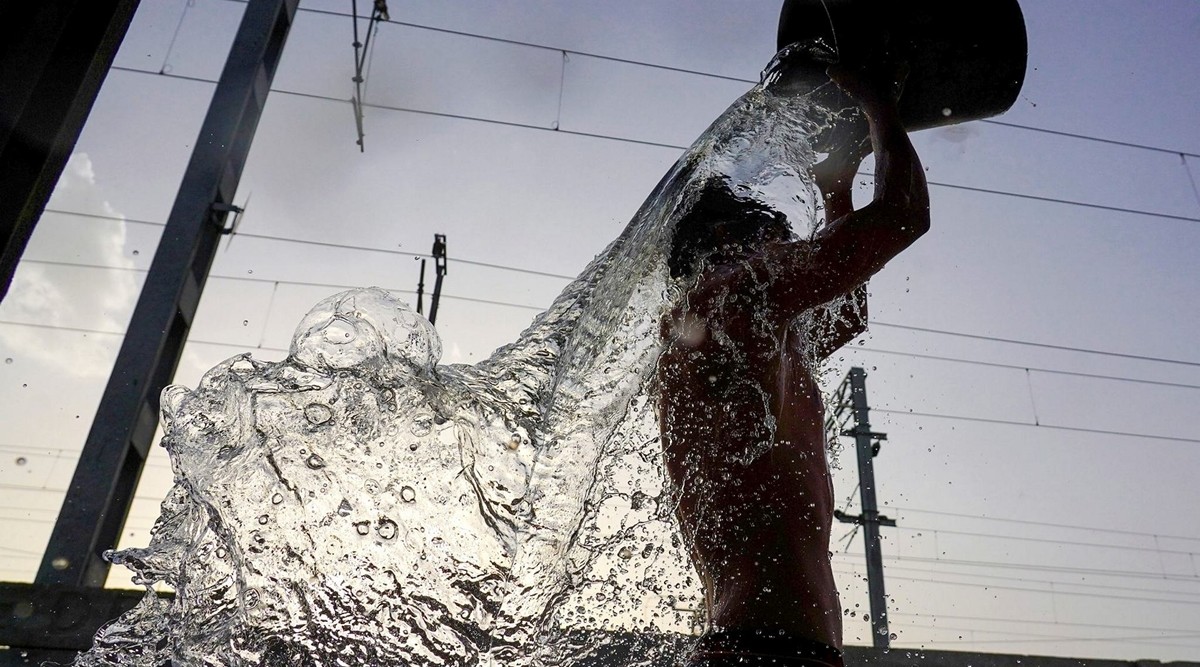 A man bathes to get respite from the heat on a hot summer day, in Ajmer, Thursday. (PTI)
A man bathes to get respite from the heat on a hot summer day, in Ajmer, Thursday. (PTI)Prime Minister Narendra Modi on Thursday reviewed the situation relating to heat wave management and monsoon preparedness in a high-level meeting and advised states and union territories to have heat action plans in place at both state, as well as city and district levels. In the aftermath of a gruelling March and April – with some of the highest temperatures in over a century, the prime minister instructed officials to take steps to avoid deaths related to either heat waves or fire incidents.
The India Meteorological Department has warned that after respite over the last few days, heatwave conditions are expected over parts of Maharashtra, Vidarbha, Rajasthan, Haryana, Uttar Pradesh, Madhya Pradesh, Vidarbha and Delhi over the coming days. Met department officials pointed out, however, that this spell of heatwaves would not be as intense as what was experienced in the past two months.
While India saw the warmest March in 122 years, it experienced the third warmest April in the same period. Frequent heatwaves affected major parts of the country during April, taking the maximum temperatures at many places in west Rajasthan, east Uttar Pradesh, west Madhya Pradesh, Vidarbha in Maharashtra to over 45 degrees Celsius. The monthly average maximum temperature recorded over the country last month was 35.30 degrees Celsius versus a normal of 33.94 degrees.
During the meeting, IMD and NDMA briefed the PM about the persistence of high temperatures in March-May 2022 across the country as well as the South West Monsoons. Over the past few years, as heatwaves have gained in both frequency and intensity, various states have started putting in place Heat Action Plans which are monitored by the NDMA in collaboration with inputs from IMD.
Best of Express Premium
The PM has advised that apart from these, ‘Flood Preparedness Plans’ also be put into place by states. The NDRF has been advised to develop its deployment plan in flood affected states, including sensitisation of communities through social media.
PM Modi observed that all measures need to be taken to avoid deaths due to heat wave or fire incident and added that our response time towards any such incidents should be minimal. He stressed, that in view of the rising temperatures, regular hospital fire safety audits need to be done.
Officials said that the PM spoke about the need to work to substantially reduce the vulnerability of forests across the diverse forest ecosystems in the country against fire hazards, enhance the capabilities of forest personnel and institutions for timely detection of a possible fire and for fighting fires, and to speed up recovery after a fire event.
PM directed that in view of upcoming monsoons, arrangements for monitoring the quality of drinking water need to be ensured to avoid contamination and resultant spread of water-borne diseases.
It was discussed in the meeting about the need for effective coordination between central and state agencies to ensure preparedness of all systems for any incidents in the wake of heat wave and upcoming monsoons.
‘These heatwaves are not unprecedented. It was much worse in 2010. But since 2010, this year has definitely been the worst. In the past few years, temperatures have been steadily rising globally. This increase in temperatures has led to the frequency of heatwaves – and this trend of frequent heatwaves is persisting. This does not however mean that there will be heatwaves every year,’’ DG IMD Dr.M.Mohapatra told The Indian Express.
The meeting was attended by the Principal Secretary to PM, Advisors to PM, Cabinet Secretary, Secretaries in the Ministries of Home, Health, Jal Shakti, Member NDMA, DGs of National Disaster Management Authority (NDMA) and Indian Meteorological Department (IMD) and DG NDRF.
- The Indian Express website has been rated GREEN for its credibility and trustworthiness by Newsguard, a global service that rates news sources for their journalistic standards.

